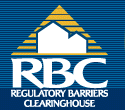|
Regulatory Barriers to Affordable Housing
This State of Georgia guide provides information on how local governments can overcome regulatory barriers to affordable housing. Although many barriers to affordable housing are beyond local government control, there are factors affecting housing cost that can be reduced by removing or reducing the barriers within local government control. For local governments, this guide suggests assembling stakeholders, such as local government and business groups, assessing housing needs and future goals through a comprehensive planning process, evaluating zoning classifications and current land uses, and evaluating and reforming current regulatory processes. For example, in order to abbreviate the approval process, this toolkit suggests: enforcing time limits; developing one-stop permitting and joint public hearings; and increasing the role of staff in decision making.
The toolkit also suggests creating regulatory incentives, establishing early vesting and development agreements; and using inclusionary zoning as ways of facilitating the development process and increasing the amount of available affordable housing. After a community identifies the specific regulatory barriers and development regulations hampering affordable housing, this guide suggests ways to reform those regulatory processes, such as instituting reforms in local zoning, subdivision, infrastructure, and environmental standards that remove potential obstacles to housing production. The guide suggests reducing excessive development standards; removing policies that unduly restrict land supply for development; allowing conversions of single-family homes to include apartments; offering incentives for the development of low- and moderate-income housing; and following all legal requirements for public notice, meetings and adoption.
http://www.dca.state.ga.us/intra_nonpub/Toolkit/Guides/BarriersAffHousing.pdf
 Toolkits Page Toolkits Page
|


